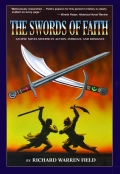What Sir Walter Scott’s The Talisman Says About His Times June 15, 2010
Posted by rwf1954 in historical fiction, literary commentary, Sir Walter Scott, The Talisman.Tags: historical context, Richard the Lionheart, Saladin, Sir Walter Scott, The Talisman
trackback
(Richard Warren Field wrote the award-winning novel,
The Swords of Faith. Read why this book will make a great movie.)
Literature reflects the times of its creation. My novel, The Swords of Faith, about Richard the Lionheart and Saladin, reflects our current 21st Century circumstances. The same two characters were immortalized in Sir Walter Scott’s novel, The Talisman. I have commented at length about the history in The Talisman. Here, I will just make some quick observations about what Scott’s novel says about his times.
Scott makes no claim at all that he is presenting accurate history. He is quite frank about this in his Preface. He states his intention to be true to the characters. And for Scott, I think one of the most important aspects of that issue was presenting the noble nature, the chivalry, of Saladin. Scott presents Richard the Lionheart as a dashing figure, but with flaws of vanity and impulsiveness, and as a victim of bitter factions among his fellow Christians. Scott also elevates Scottish characters to an importance not recorded in the history of the period. What was happening in Scott’s world that led to these priorities?
First, Western Europe was only a decade or so removed from the Napoleonic wars, and continued to be torn apart by fervent nationalism. Christian factions in The Talisman, and their destructive effect, allowed a historical lesson for Scott’s time, although Scott’s emphasis on Scottish characters ironically serve to illustrate the nationalist tenor of the times.
Second, Great Britain’s empire was approaching its zenith. “The sun never sets” on the empire; Great Britain was absorbing humans from different and exotic cultures. It was certainly important to peace in the empire for the British to honor and appreciate the nobility of heroes from other cultures. Saladin presented Scott with the perfect opportunity to develop this theme.
Third, the Ottoman Empire was shrinking, and Muslim areas were coming into Western European spheres of influence. A positive, respectful attitude toward Islam could help that absorption occur smoothly.
I suspect there are other ways The Talisman reflected the times of Sir Walter Scott. I invite your comments!
Tomorrow, I’ll discuss how I believe my novel, The Swords of Faith, reflects our times.
Link to purchase The Talisman at Amazon.com:




Dear Mr. Warren:
Can you possibly identify for me the source — probably fictional, maybe Walter Scott — of the supposed conversation between Saladin and Richard where Richard vainly tries to explain that water (in a lake) can freeze and become as hard as stone? I have a vivid recollection of reading this in my youth. Despite the probability that the two warriors never met at all and further that Saladin would at least have been aware of snow, I would love to find the source of this conversation. My wife and I are going to Israel and have booked a hotel in Acre for part of the trip.
I don’t recall that story from THE TALISMAN; I don’t know if it comes from any other Sir Walter Scott writing. (Does anyone reading these comments know?) Of course Saladin knew about snow. Snow from nearby mountains was used to cool drinks; I recall seeing that in some of the historical sources I consulted for my novel. I can assure you there is no historical source that indicates Richard and Saladin ever met. In my novel about this time period, THE SWORDS OF FAITH, I resisted the temptation to have them meet. The true history is every bit as intriguing as the invented stories about these fascinating historical figures.
Have fun in Israel!
It was the scot knight kenneth who talks to Saladin about riding over the ice at the start of the book